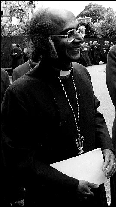|
Interfaith relations main focus by E.T. Malone Jr.
``The one reality is that both Islam and Christianity are missionary religions, both are operating in Africa and East Asia, so the potential for conflict between them is greater--but the need for getting along is greater. That's the crux,'' said Bishop NazirAli, a native of Pakistan who is now Bishop of Rochester (England). ``When we designed the Conference, nearly every province said relations with other faiths was an important topic,'' he notes. ``The pre-Lambeth design group decided every section should consider the interfaith aspects of its work.'' Because the Anglican Communion is worldwide, ``we're in relationships with people of almost every faith,'' Bishop Nazir-Ali said.``There's a triangular Christian-Jewish-Muslim situation in Palestine. In India the new government is inspired by Hindu ideals. But in the largest number of cases, the interface is between Christianity and Islam.'' Setting stereotypes asideMedia images of Islam often are violent and intolerant, Bishop Nazir-Ali pointed out.``We have to ask, however, whether these are the only available images of Islam.What else can we say about a great world faith which has given rise to so many civilisations?'' He said he has taken on the task, as part of his Christian mission, to teach that Islamic law or shari'ah is not unchangeable, that it does have flexibility, and that the basic tenets of Islam are, in fact, democratic. There are those who have a vested interest in arguing that the shari'ah does not change, he noted. ``In Pakistan the blasphemy law is, in fact, profoundly un˝Islamic. In the Koran there is no punishment on earth for apostasy, nor for blasphemy. The Prophet himself forgave those who insulted him. We must continue to campaign for its repeal.'' Some governments, however, ``such as the oppressive, ideologically driven regime in Sudan, seem to use adherence to Islamic law as a way of legitimising government ambitions,'' he said. ``In Iran the shari'ah was seen as a way of cleansing the country of Western influences after a corrupt regime was deposed.'' Asked whether Islamic law should be applied only to Muslims, or to all who reside in Muslim majority countries, Bishop Nazir-Ali said ``people should be committed to fundamental freedoms wherever they are. People of all faiths should have equal rights.'' But he added: ``Such principles have been abandoned in Pakistan, even though it was founded on the principle that Muslims were an oppressed minority in undivided India.'' Turning study into resolutionsResolutions will have to be carefully worded to address the specific situations of particular countries. For example, he said, ``we want the resolution to be one that encourages the opening up of Iran, not one that is condemnatory. We want to support those moderate Muslims who are working to open up the country. There is a struggle there that could go either way.'' The Rev Colin Chapman, Lambeth consultant and founder of an organisation called Faith to Faith, which promotes Christian-Muslim interfaith cooperation, said: ``We've got so much more in common with devout Muslims than with our pagan, secular British neighbours.`` His book, Cross & Crescent: Responding to the Challenge of Islam, attempts to defuse the fears of many Westerners who see Islam not only as a challenge but as a threat. At a time when Christians have privatised their faith, he said, here come Muslims ``who want to bring God into the public sphere. They've actually challenged Christians this way.'' Of course, it is dangerous to generalise on the basis of ChristianMuslim relations in any one country, he warned. Mr Chapman acknowledged that, as with the attempt of such conservative groups as the Moral Majority to influence politics in the United States, the entrance of religious groups into public enterprises may have both positive and negative consequences. Different sidesBishop Nazir-Ali will open the plenary by delivering a general introduction on the history of Muslim-Christian relations, good and bad. Next will come talks by the three pairs of bishops, distributed geographically and in terms of the nature of the relationships they have experienced with Islam. ``From the
continent of Africa, we will have a discussion from the Gambia, where relations are
quite good, and then from Nigeria, where there are some sharp issues but also some
sharing,'' he said. ``From Asia, we'll have a presentation from Palestine, where
both Christians and Muslims have struggled together for fundamental rights and some
autonomy--although now the situation is deteriorating between them, primarily because
of terrorism by the extreme Muslim organisation Hamas--and from Pakistan, where there
is very little history of cooperation. ``Finally, from Britain and North Africa,
we will have additional perspectives of mixed good and bad relationships.'' |

 The Lambeth plenary
on Muslim-Christian relations and the Anglican Communion will look at Islam ``not
in isolation but rather in the context of our entire attention to interfaith relations
here at the Lambeth Conference,'' says Bishop Michael Nazir-Ali, the plenary coordinator.
The two-hour plenary, scheduled for 3.30pm today, will present three pairs of bishops
from different areas ``who will speak about how they find such relations in their
regions,'' Bishop Nazir-Ali said. The Conference is paying special attention to Muslim-Christian
relations, however, because Islam is a special case.
The Lambeth plenary
on Muslim-Christian relations and the Anglican Communion will look at Islam ``not
in isolation but rather in the context of our entire attention to interfaith relations
here at the Lambeth Conference,'' says Bishop Michael Nazir-Ali, the plenary coordinator.
The two-hour plenary, scheduled for 3.30pm today, will present three pairs of bishops
from different areas ``who will speak about how they find such relations in their
regions,'' Bishop Nazir-Ali said. The Conference is paying special attention to Muslim-Christian
relations, however, because Islam is a special case.